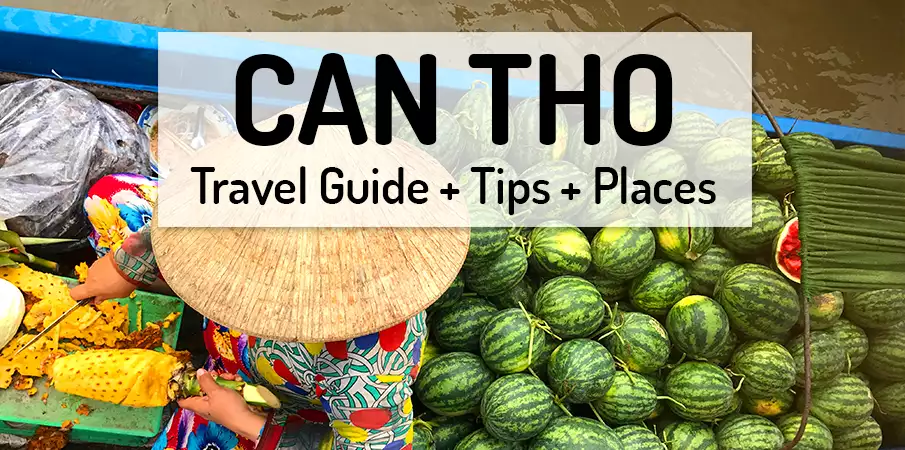
ℹ️ Information – Can Tho
🚍 How to get to Can Tho
☀️ Weather in Can Tho
🏡 Where to stay in Can Tho
🔍 Sightseeing in Can Tho
❓ FAQ + Travel Tips + Info
🎫 Book a Tour in Can Tho
🎫 Book Ticket to Can Tho
Quick answer: Can Tho is a peaceful Mekong Delta city famous for its floating markets, lush river life, and traditional villages. It’s a great place to explore by boat, taste southern Vietnamese food, and experience authentic delta culture.
At a glance:
- 🛶 Cai Rang Floating Market: The most famous early‑morning river market with boats trading fruits and produce.
- 🌉 Ninh Kieu Wharf & Bridge: Riverside area to stroll, take river cruises, and enjoy views over Hau River.
- 🕊️ Bang Lang Stork Sanctuary: Wetland sanctuary near Can Tho where thousands of storks gather.
- 🏠 Historic Homes: Visit Binh Thuy Ancient House — a beautifully preserved French‑style villa.
- 🎨 Can Tho Museum: Exhibits local history, ethnic cultures, and river life.
- 🍜 Local Cuisine: Try Mekong Delta specialties like hu tieu noodles and southern-style pancakes.
- 🚤 Boat Tours: Explore canals, stork sanctuary, and nearby islets by sampan or motorboat.
- 🕰️ Best Time to Visit: Early morning for floating markets; afternoons for bird‑watching and peaceful cruises.
Last updated in November 2025
Location and Geography of Can Tho:
-
- Can Tho is located in the heart of the Mekong Delta region in southern Vietnam. The city is situated on the southern bank of the Hau River, which is one of the two main distributaries of the Mekong River. The Hau River connects Can Tho to other provinces in the region, including An Giang, Dong Thap, and Vinh Long.
- Can Tho covers an area of approximately 1,401 square kilometers and is divided into nine districts. The city is characterized by a flat terrain, with the highest point being just 2.7 meters above sea level. The climate in Can Tho is tropical, with hot and humid weather throughout the year. The city experiences two distinct seasons – the dry season, which runs from December to April, and the rainy season, which lasts from May to November.
- The Mekong Delta region, including Can Tho in southern Vietnam, is known for its extensive network of rivers, canals, and rice paddies. The fertile soil and abundant water supply make it a major agricultural hub for the country, with rice, fruits, and fish being the main products. The region also has a rich biodiversity, with many rare and endangered species of plants and animals.
- Despite being a highly productive region, the Mekong Delta is also vulnerable to climate change and rising sea levels. The city of Can Tho has implemented several measures to adapt to these challenges, including building sea walls, planting mangrove forests, and promoting sustainable agriculture practices.
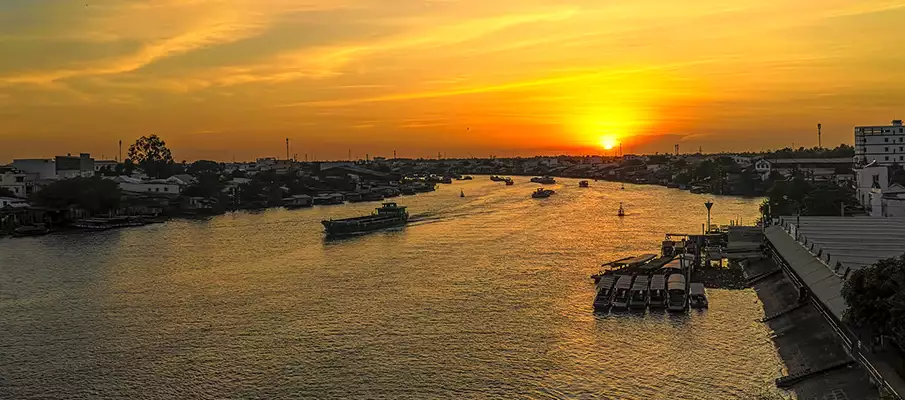
Can Tho: A City Rich in History, Culture, and Natural Beauty.
-
- Can Tho has a rich history and culture that is deeply rooted in the Mekong Delta region. The city was founded in the early 18th century as a small trading post on the Hau River, and it quickly grew into a bustling commercial center.
- During the French colonial period, Can Tho became an important transportation hub, connecting the Mekong Delta to other regions of Vietnam. The city was also a center for the resistance movement against French rule, with many local people joining the fight for independence.
- After Vietnam gained independence in 1954, Can Tho continued to play an important role in the country’s economic development. The city underwent significant growth and modernization during the 1980s and 1990s, with the construction of new roads, bridges, and buildings.
- Can Tho is also home to a rich cultural heritage, with many festivals, traditions, and customs that have been passed down from generation to generation. One of the most popular festivals in the city is the Ninh Kieu Flower Festival, which takes place every year in the spring. During this festival, the streets of Can Tho are decorated with colorful flowers, and people gather to celebrate the arrival of spring.
BOOK a TOUR / ACTIVITY in Can Tho ➜
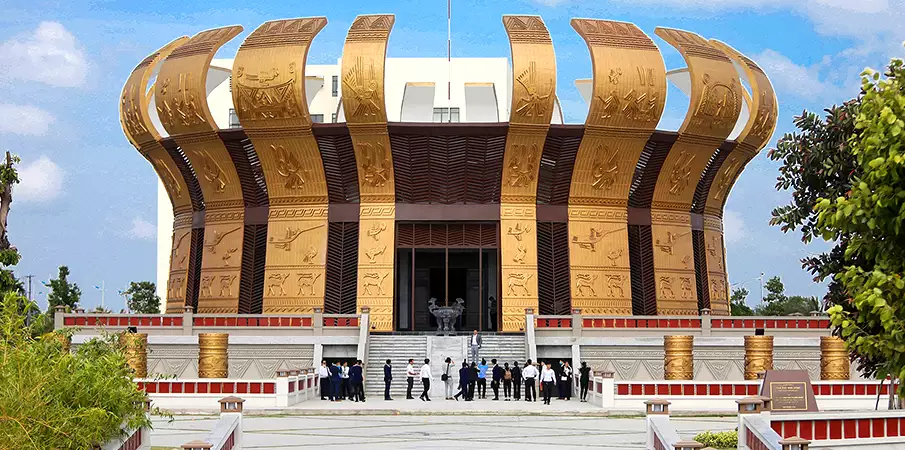
Experience the Vibrant Culture at Can Tho’s Festivals:
Can Tho is a vibrant city with a rich cultural heritage, and it is home to many festivals and events throughout the year. These celebrations offer visitors a chance to experience the unique traditions and customs of the Mekong Delta region. Here are some of the most popular festivals and events in Can Tho:
-
- Ninh Kieu Flower Festival: This festival takes place every year in late January or early February to celebrate the arrival of spring. During the festival, the streets of Can Tho are adorned with colorful flowers, and visitors can enjoy traditional music and dance performances.
- Southern Folk Cake Festival: This festival celebrates the diverse culinary traditions of the Mekong Delta region. Visitors can sample a wide variety of traditional cakes and sweets, such as banh tet, banh chung, and banh bo.
- Tay Do Night Market: This bustling night market takes place every evening in the heart of Can Tho. Visitors can sample delicious street food, shop for souvenirs and handicrafts, and enjoy live music and entertainment.
- Ok Om Bok Festival: This is a traditional Khmer festival that takes place every year in late October or early November. The festival celebrates the end of the rice harvest and includes traditional dance performances, boat races, and offerings to the Moon God.
- Cai Rang Floating Market: This is one of the largest and most famous floating markets in the Mekong Delta. Visitors can take a boat tour of the market and watch as vendors sell fresh produce, seafood, and other goods from their boats.
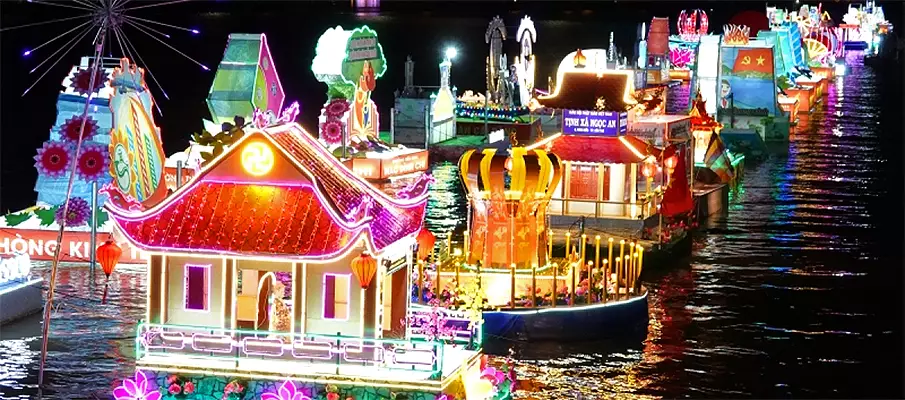
Discover the Thriving Economy of Can Tho:
-
- Can Tho is an important economic center in the Mekong Delta region of Vietnam. The city’s strategic location on the Hau River has made it a hub for trade and commerce, connecting the Mekong Delta to other regions of Vietnam and Southeast Asia. The city’s economy is diverse and includes a range of industries, including agriculture, aquaculture, manufacturing, and services. Can Tho is one of the largest producers of rice, fruit, and seafood in Vietnam, and it is home to many processing plants and factories that produce a wide range of products, such as textiles, electronics, and building materials.
- In recent years, Can Tho has also emerged as a major center for tourism, attracting visitors from around the world who come to explore the city’s rich history, culture, and natural beauty. The city has invested heavily in infrastructure and tourism development, including the construction of new hotels, resorts, and tourist attractions.
- The city’s economy has grown rapidly in recent years, with an average annual growth rate of over 7%. This growth has been driven by a combination of factors, including increased investment in infrastructure, the development of new industries, and the expansion of international trade.
Book your Accommodation in Can Tho ➜
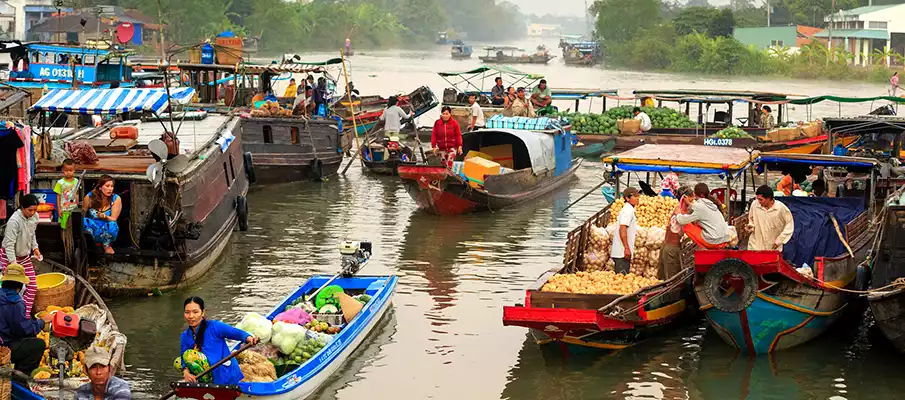
Can Tho: A Growing Hub for Sustainable Tourism in Vietnam.
-
- Tourism is a rapidly growing industry in Can Tho, Vietnam, with the city attracting an increasing number of visitors each year. The city’s rich cultural heritage, natural beauty, and vibrant economy make it a popular destination for travelers from around the world.
- One of the main attractions in Can Tho is the floating market, which is a unique and colorful spectacle that draws visitors from far and wide. Visitors can take a boat tour of the market and surrounding waterways, giving them a chance to see traditional Vietnamese life and commerce up close. In addition to the floating market, Can Tho has many other attractions for visitors to enjoy. These include historic temples and pagodas, museums, nature reserves, and cultural performances.
- The city is also well-known for its food, with a wide range of local dishes that reflect the city’s agricultural heritage and diverse cultural influences. Visitors can enjoy everything from street food stalls to high-end restaurants, with an emphasis on fresh, local ingredients and bold flavors. To accommodate the growing number of tourists, Can Tho has invested heavily in tourism infrastructure in recent years. This includes the construction of new hotels and resorts, improvements to transportation links, and the development of new tourist attractions.
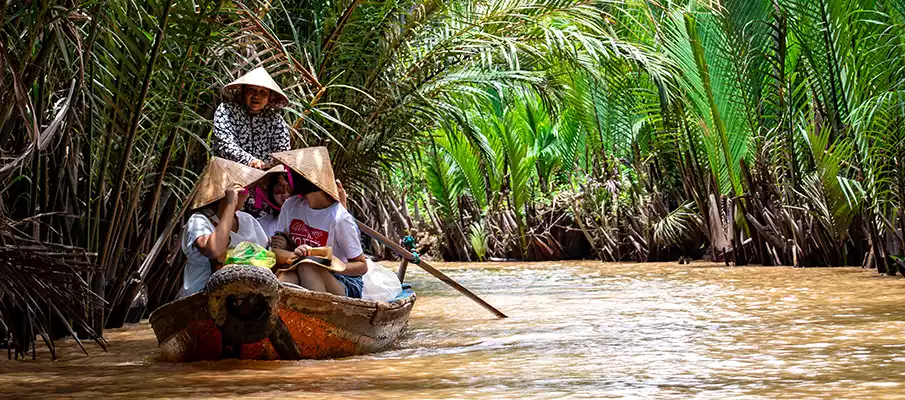
Explore the floating market in Can Tho:
-
- The floating market in Can Tho is one of the most famous and unique attractions in the Mekong Delta region of Vietnam. The market is located on the Hau River, one of the two main branches of the Mekong River, and it is a bustling hub of activity where local vendors sell fresh produce, seafood, and other goods from their boats.
- The market starts early in the morning, with vendors arriving in their boats loaded with goods to sell. The boats are typically anchored in the river, and customers can approach them in smaller boats to make their purchases. Each boat displays its goods on a long bamboo pole, indicating what is for sale.
- The floating market is an important part of the local economy, providing a source of income for many families in the region. It is also a unique cultural experience, offering visitors a chance to see traditional Vietnamese commerce in action. In addition to buying and selling goods, the floating market is also a social gathering place for locals. Many vendors live on their boats, and the market provides a place for them to catch up with friends and exchange news and gossip.
- Visitors can take a boat tour of the floating market to see the market in action and experience the sights, sounds, and smells of this vibrant and colorful place. The tour typically includes a visit to some of the nearby villages and rice paddies, giving visitors a chance to see rural life in the Mekong Delta.
BOOK a TOUR / ACTIVITY in Can Tho ➜
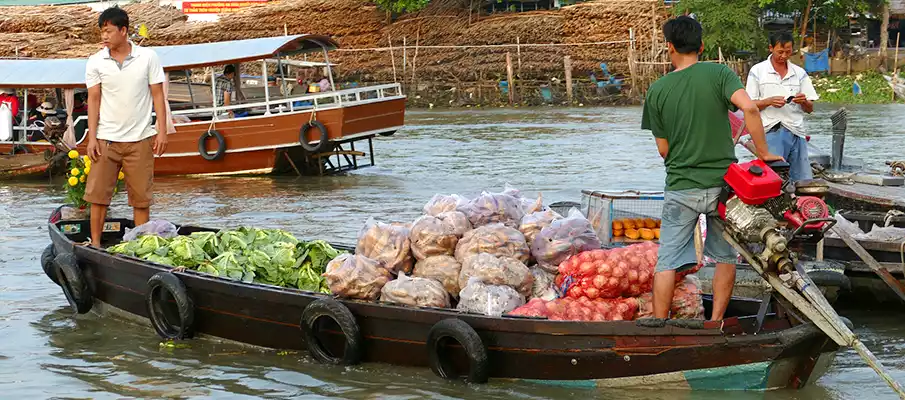
The Significance and Beauty of the Hau River in Can Tho:
-
- The Hau River (or Hau Giang River, Bassac) is a major river in Vietnam that flows through the Mekong Delta region, including the city of Can Tho. It is one of the two main distributaries of the Mekong River, the other being the Tien River. The Hau River is approximately 200 kilometers long and is an important transportation route for both goods and people in the Mekong Delta region.
- In Can Tho, the Hau River is a popular attraction for visitors and locals alike. The riverfront area is a great place to take a stroll, enjoy the views, and watch the boats and ships passing by. Visitors can also take a boat tour on the Hau River, which provides a unique perspective of the city and the surrounding countryside. The Hau River is also a prime spot for fishing, especially for catfish and carp, which are abundant in the river.
- The Hau River plays a significant role in the local economy of Can Tho, as it supports fishing, agriculture, and tourism. The river is also an important source of water for irrigation and hydroelectric power generation. Overall, the Hau River is a vital part of life in Can Tho, and its beauty and significance make it a must-see attraction for visitors to the city.
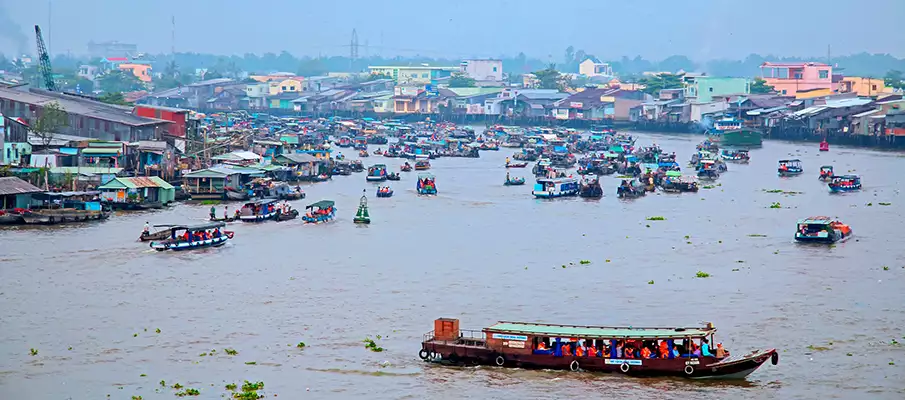
Discovering the Heart of Can Tho: Ninh Kieu Wharf.
Nestled on the banks of the picturesque Hau River in the heart of Can Tho, Vietnam, lies a place that encapsulates the essence and charm of this vibrant Mekong Delta city. Known as Ninh Kieu Wharf, it’s a captivating waterfront area that beckons travelers from far and wide with its unique blend of culture, history, and natural beauty.
-
- A Riverside Gem: Ninh Kieu Wharf is not merely a bustling commercial port; it’s a place where history and modernity coexist harmoniously. With the mighty Mekong River flowing gently alongside, this area offers a picturesque view of the river and its ever-changing landscapes.
-
- The Iconic Statue: One of the most recognizable features of Ninh Kieu Wharf is the bronze statue of Ho Chi Minh, standing tall with an outstretched arm, welcoming all who visit. This statue symbolizes the deep respect and admiration the locals have for their beloved leader.
-
- Scenic Sunset Views: For many, Ninh Kieu Wharf is synonymous with breathtaking sunsets. As the day draws to a close, the sky transforms into a mesmerizing palette of colors, casting its warm glow over the river and the city. It’s a sight that leaves an indelible mark on the memory of anyone who witnesses it.
-
- Riverfront Dining and Entertainment: The wharf is also famous for its vibrant atmosphere, offering a multitude of dining options. Enjoy the freshest local cuisine at the riverside restaurants, sip on a cup of Vietnamese coffee, or sample the renowned „hu tiu,“ a local noodle dish.
-
- Floating Market Excursions: Ninh Kieu Wharf is the gateway to exploring Can Tho’s world-famous floating markets. Early morning boat trips from the wharf take you to the heart of these lively markets, where you can witness the local way of life and taste fresh produce straight from the Mekong Delta.
-
- Cultural Hub: Throughout the year, the wharf hosts cultural events, festivals, and fairs that showcase the rich heritage of the region. It’s a place where tradition and modernity converge, creating a dynamic and lively atmosphere.
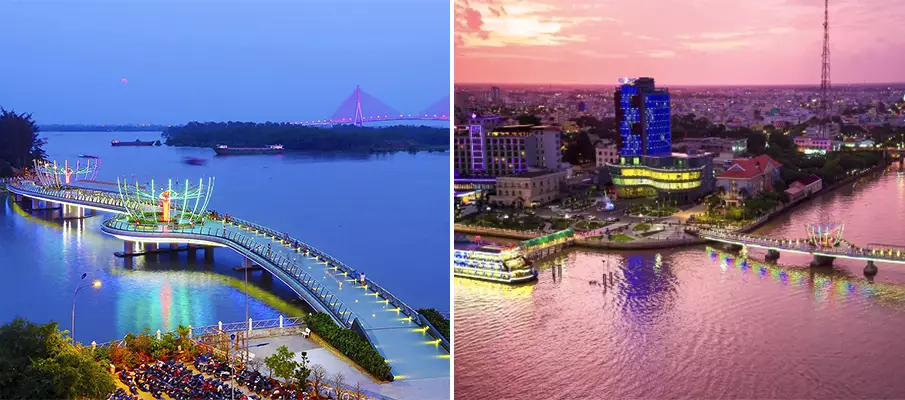
Exploring Truc Lam Phuong Nam Zen Monastery in Can Tho.
Vietnam, a country deeply rooted in spirituality and rich traditions, is home to numerous temples and monasteries. In the heart of the Mekong Delta, nestled amidst the lush countryside of Can Tho, lies the Trúc Lâm Phương Nam Zen Monastery, a serene and spiritually enriching destination that beckons visitors seeking a peaceful escape and a deeper connection with their inner selves.
-
- A Place of Tranquility: The Trúc Lâm Phương Nam Zen Monastery is a hidden gem, located away from the hustle and bustle of the city. This secluded haven exudes an air of tranquility and serenity that is truly captivating. Surrounded by a tranquil landscape of rice fields, lotus ponds, and native vegetation, the monastery offers a peaceful retreat from the fast-paced world.
-
- Zen Buddhism and its Teachings: As a Zen Buddhist monastery, Trúc Lâm Phương Nam adheres to the principles of Zen Buddhism, which emphasizes mindfulness, meditation, and the pursuit of enlightenment. Visitors have the opportunity to engage in guided meditation sessions, where they can learn the art of being present in the moment and discover the profound wisdom that Zen Buddhism offers.
-
- Architectural Elegance: The monastery’s architecture is a testament to Vietnamese design and aesthetics. The main hall, with its sloping curved roofs, intricate carvings, and serene Buddha statues, evokes a sense of reverence and wonder. The monks and nuns in their traditional saffron robes quietly move about the grounds, adding to the tranquil ambiance.
-
- Meditation Gardens and Scenic Views: Trúc Lâm Phương Nam boasts beautiful meditation gardens and paths where visitors can take contemplative strolls. These gardens are adorned with flowers, bonsai trees, and stone sculptures, creating an environment that promotes mindfulness and reflection.
-
- Retreats and Workshops: For those seeking a deeper immersion in Zen practice, the monastery conducts retreats and workshops, where participants can learn more about meditation techniques, Zen philosophy, and the art of mindful living.
Visiting Tips for Truc Lam Phuong Nam Zen Monastery:
-
- Dress modestly when visiting the monastery.
- Be respectful of the monks, nuns, and other visitors.
- Silence is encouraged in many areas to maintain the tranquil atmosphere.
- Check the monastery’s schedule for meditation sessions and special events.
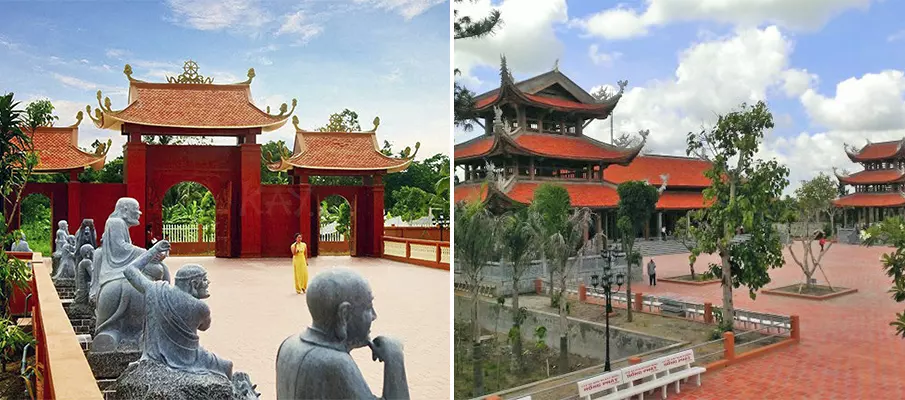
Why to visit or not to visit Can Tho?
Can Tho is a city located in the Mekong Delta region of Vietnam, so it is a good idea to go there, if you want to see Mekong River. Here are some reasons why you may want to consider visiting Can Tho, as well as some reasons why you might want to skip it:
👉 Reasons to visit Can Tho:
-
- Floating markets: Can Tho is famous for its floating markets, where vendors sell fruits, vegetables, and other goods from their boats. The Cai Rang Floating Market is the largest and most popular floating market in the city.
- Mekong Delta experience: Can Tho is a great place to experience the Mekong Delta region of Vietnam, with its waterways, rice paddies, and rural villages.
- Food: Can Tho is known for its delicious food, including local specialties like banh xeo (Vietnamese savory pancake), bun rieu (Vietnamese crab noodle soup), and hu tieu (Vietnamese noodle soup).
- Gardens: Can Tho has several beautiful gardens, including the My Khanh Ecotourism Village and the Binh Thuy Ancient House, which are great places to relax and enjoy the scenery.
- Culture: Can Tho is home to several ethnic minority groups, including the Khmer, and there are several temples and cultural sites in the area that are worth visiting.
👉 Reasons not to visit Can Tho:
-
- Crowds: Can Tho can get quite crowded, especially during peak tourist season, which may be a turnoff for some travelers who are looking for a more secluded and peaceful destination.
- Weather: The weather in Can Tho can be quite hot and humid, which may not be ideal for some travelers who are sensitive to heat.
- Limited attractions: Can Tho may not have as many attractions as some other destinations in Vietnam, so travelers who are looking for a lot of things to do and see may want to consider other destinations.
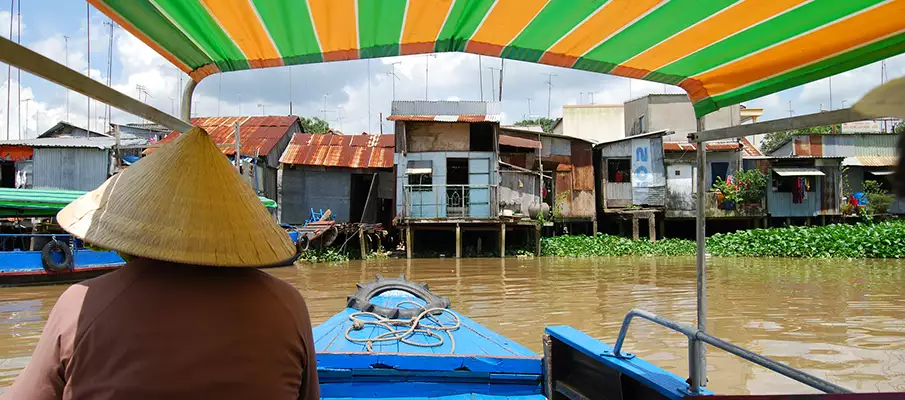
Food and Cuisine in Can Tho:
-
- The food and cuisine in Can Tho is a reflection of the city’s agricultural heritage and diverse cultural influences. Located in the fertile Mekong Delta region of Vietnam, the city is known for its fresh and flavorful dishes that make use of a wide range of local ingredients.
- One of the signature dishes of Can Tho is banh cong, a type of savory cake made from rice flour, shrimp, and pork. Another popular dish is bun rieu, a soup made with vermicelli noodles, crab meat, and tomato broth. Other local specialties include ca loc nuong trui (grilled snakehead fish), and mam ca sac (fermented fish sauce). The city is also known for its fresh fruit, with a wide variety of tropical fruits grown in the region, including pomelo, rambutan, and dragon fruit. Visitors can enjoy fresh fruit juices and smoothies at the many street stalls and cafes throughout the city.
- Can Tho has a lively street food scene, with many vendors selling their wares from bicycles and carts. Visitors can sample a wide range of local specialties, including banh mi (Vietnamese sandwiches), pho (noodle soup), and banh xeo (savory pancakes). For those looking for a more upscale dining experience, Can Tho has a growing number of high-end restaurants offering a fusion of local and international cuisine. Many of these restaurants source their ingredients locally, and offer creative takes on traditional dishes.
Book your Accommodation in Can Tho ➜
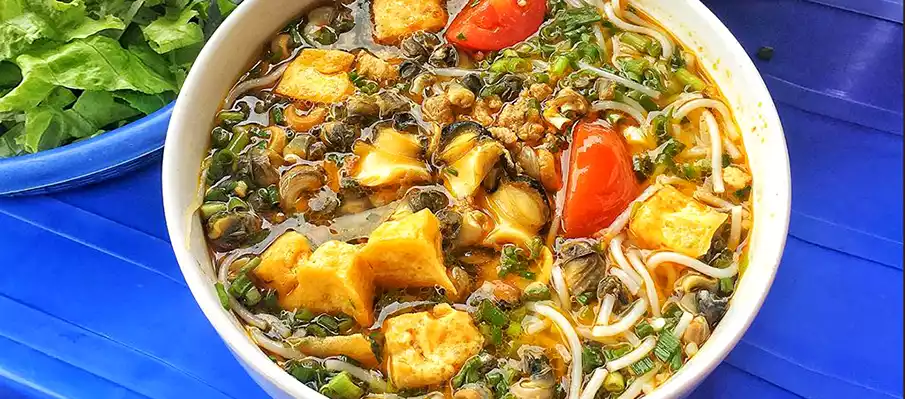
🚍 How to get and travel to Can Tho?
Can Tho is located in the Mekong Delta region of Vietnam, and is easily accessible by air, bus or private car, motorbike.
-
- By Air: Can Tho International Airport (VCA) is the main airport serving the city, with daily flights to and from major cities in Vietnam, as well as international destinations such as Bangkok and Kuala Lumpur. From the airport, visitors can take a taxi or shuttle bus to the city center.
- By Bus: Can Tho is well-connected to other cities in the Mekong Delta region by bus. Visitors can take a bus from Ho Chi Minh City (Saigon), which takes approximately 3-4 hours, or from other cities such as Rach Gia or Ca Mau. There are several bus stations in Can Tho, including the main Can Tho Bus Station, where visitors can catch buses to other destinations in the region.
- By Taxi/Car: You can also travel to Can Tho by private taxi/car from Ho Chi Minh City or nearby towns. You can book your car to Can Tho easily online.
- If you want to travel to Tan Son Nhat Airport, read this article: How to go to Tan Son Nhat Airport from Can Tho? The most comfortable option is to travel by private car, but you can also travel by bus with stopover in Saigon.
- Book and buy tickets / car to Can Tho in Vietnam on Baolau ➜ or 12go.asia ➜.

☀️ Weather in Can Tho + The Best Time to Visit:
Can Tho is a city located in the Mekong Delta region of Vietnam. It has a tropical monsoon climate, which means it experiences distinct wet and dry seasons throughout the year. Understanding the weather patterns can help you plan the best time to visit Can Tho.
-
- Climate Overview: Can Tho in southern Vietnam experiences a hot and humid tropical climate. There are two main seasons: the wet season and the dry season.
-
- Wet Season (May to October): This period is characterized by heavy rainfall, high humidity, and occasional flooding, as it is situated in the delta of the Mekong River. The wet season peaks from June to August when the city receives the most rainfall. While the wet season can make outdoor activities less appealing, it is a great time to witness the lush green landscape and experience the local way of life.
-
- Dry Season (November to April): The dry season is more popular among tourists due to its pleasant weather conditions. November to January is cooler and less humid, making it a comfortable time to explore the city. January and February are often considered the best months to visit Can Tho because of the milder temperatures and lower humidity.
-
- Best Time to Visit: The best time to visit Can Tho for most travelers is during the dry season, from November to April, with January and February being the peak months. During this period, you can enjoy outdoor activities like boat trips along the Mekong River, explore the floating markets, and visit nearby attractions without the hindrance of heavy rain. Additionally, the cooler and drier weather makes for a more comfortable and pleasant experience.
-
- Local Festivals: If you’re interested in experiencing local culture and traditions, consider planning your visit to coincide with festivals such as the Tet Festival (Vietnamese Lunar New Year), which usually falls between January and February. This is a great time to immerse yourself in Vietnamese culture and festivities.
| Month | Weather | Description |
|---|---|---|
| January | Cool and Dry | January in Can Tho is characterized by cool temperatures and dry weather, creating pleasant conditions for exploring the city’s attractions and enjoying the local culture. |
| February | Cool and Dry | February continues the cool and dry weather, making it an ideal time to visit Can Tho’s floating markets and experience the unique charm of the Mekong Delta. |
| March | Warm and Dry | March brings warmer temperatures and dry weather to Can Tho, creating favorable conditions for boat tours along the Mekong River and exploring the city’s historical sites. |
| April | Hot and Dry | In April, Can Tho experiences hot and dry conditions, with high temperatures and clear skies. It is a great time to witness the vibrant agricultural activities in the region. |
| May | Hot and Wet | May continues with hot temperatures and increased rainfall, providing a lush green landscape in Can Tho. It is a good time to explore the city’s natural beauty and enjoy fresh tropical fruits. |
| June | Hot and Wet | June is characterized by hot and wet weather in Can Tho, with occasional showers and high humidity. It is a quieter month, perfect for exploring indoor attractions and immersing in local traditions. |
| July | Hot and Wet | Similar to June, July remains hot and wet, with increased rainfall. It is a good time to experience the vibrant wetland ecosystem and enjoy traditional festivals in Can Tho. |
| August | Hot and Wet | August continues the hot and wet weather pattern, with frequent showers and high humidity. It is a great time to visit the city’s beautiful pagodas and taste local delicacies. |
| September | Hot and Wet | September in Can Tho is hot and wet, with intermittent showers and high humidity. It is a good time to explore the rural countryside and engage in agricultural activities. |
| October | Warm and Wet | October brings warm temperatures and increased rainfall to Can Tho, offering a quieter time to visit and explore the city’s cultural heritage and sample authentic Mekong Delta cuisine. |
| November | Cool and Dry | As November arrives, Can Tho experiences cooler temperatures and dry weather, making it an ideal month for boat trips to the floating markets and enjoying the peaceful ambiance of the Mekong River. |
| December | Cool and Dry | December in Can Tho is characterized by cool temperatures and dry weather, providing a pleasant atmosphere for exploring the city’s canals, cycling through villages, and experiencing the local way of life. |
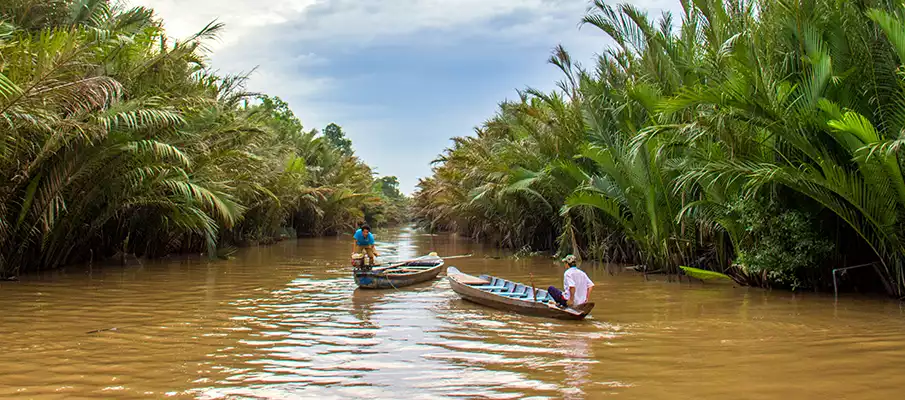
🏡 Accommodation in Can Tho / Where to stay:
Accommodation options in Can Tho, Vietnam, cater to a diverse range of preferences and budgets. Here’s a list of different types of accommodations you can find in Can Tho:
-
- Hotels: Can Tho boasts a variety of hotels, from upscale to budget-friendly. You’ll find internationally recognized chains and locally-owned options. These hotels offer a wide range of amenities, including restaurants, spas, and comfortable rooms.
-
- Boutique Hotels: Boutique hotels in Can Tho offer a unique and often more intimate experience. They are known for their distinct design, personalized service, and attention to detail.
-
- Guesthouses: Guesthouses are smaller, often family-run establishments that provide affordable and cozy accommodations. They are popular among budget travelers looking for a homey atmosphere.
-
- Hostels: Can Tho has several hostels that cater to backpackers and budget-conscious travelers. Hostels usually offer dormitory-style rooms, communal spaces, and a lively social atmosphere.
-
- Homestays: For a more immersive cultural experience, you can stay in homestays. These are typically traditional houses or family homes where travelers are welcomed as guests. It’s an excellent way to connect with local culture.
-
- Resorts: Can Tho features a few high-end resorts offering luxury accommodations, spa services, and beautiful riverfront settings. These resorts are ideal for a serene and indulgent getaway.
-
- Floating Hotels: Given Can Tho’s location in the Mekong Delta, you can find unique floating hotels where you can sleep right on the water. These floating accommodations offer a distinctive experience.
When choosing your accommodation in Can Tho, consider factors such as your budget, the type of experience you desire, and the location of the accommodation. Staying near the riverfront in Ninh Kieu provides easy access to attractions and dining, while resorts along the river offer a peaceful retreat. Be sure to read reviews, check availability, and book in advance, especially during peak tourist seasons.
➜ Accommodation in Can Tho – Book Here ➜
🔍 Interesting Places + Activities in Can Tho:
-
- Cai Rang Floating Market: The water markets are among the most significant symbols of Can Tho. Local vendors sell fresh produce, seafood, and other goods from their boats. The largest and most popular market is Cai Rang. You can take a boat trip to experience this unique atmosphere.
- Mekong Delta: Exploring the Mekong Delta is an unforgettable experience. The maze of rivers, canals, and rice fields offers a great view of rural life and the scenic beauty of the region. Walking, cycling, or boat tours are great ways to explore this area.
- Ninh Kieu Wharf: This is the main wharf in Can Tho and a popular spot for locals and tourists alike. You can relax here, enjoy views of the river and boats, and sample local cuisine from food stalls. The wharf is beautifully illuminated at night and offers a romantic atmosphere.
- Binh Thuy Ancient House: This historical house showcases traditional architecture and design in the region. With its elegant embellished details and interesting history, visiting this place is a memorable experience.
-
- Truc Lam Phuong Nam Zen monastery: Trúc Lâm Phương Nam Zen Monastery is a serene and spiritually significant Buddhist monastery located in Can Tho, Vietnam. It follows the principles of Zen Buddhism and offers a peaceful retreat amidst a beautiful natural landscape. Visitors can engage in meditation, explore tranquil gardens, and enjoy vegetarian cuisine, all while experiencing the tranquility and wisdom of Zen Buddhism.
- My Khanh Ecotourism Village: This village offers an authentic view of rural life and traditions of the Mekong Delta. You can take a boat ride, sample local food, and observe local crafts and customs here.
- Tay Do Night Market: This lively night market is a great place to taste local food and buy souvenirs. The atmosphere is vibrant with music and stalls offering various treats.
- Can Tho Museum: The Can Tho Museum offers an interesting view of the history and culture of the region. Exhibits include traditional clothing, tools, artifacts, and information about life in the Mekong Delta.
- Ninh Kieu Viewing Tower: This tower offers a panoramic view of the city, river, and surrounding landscape. It’s a great spot for photography and watching the sunset.
- Bang Lang Stork Sanctuary: This sanctuary is home to thousands of white storks. You can observe birds in their natural habitat and enjoy an unforgettable experience.
- Vincom Plaza Xuan Khanh Shopping Center: For those who want to shop or sample local cuisine, this modern shopping center is a great place. You’ll find shops, restaurants, and entertainment activities here.
- Phong Dien Traditional Village: Phong Dien Village is known for its traditional market where you can taste various types of food, fruits, and vegetables. It’s a great place to experience local life.
- Chùa Bình Thủy Pagoda: This beautiful pagoda holds religious significance. Its architecture and serene atmosphere make it an ideal place for relaxation and meditation.
- Thanh Nhan Market: This market offers various types of local food, souvenirs, and clothing. You can practice your bargaining skills here.
- Lý Thái Tổ Park: This park is a perfect place for relaxation, picnics, or outdoor activities. Locals come here for walks and relaxation in a pleasant environment.
📍 Can Tho in Mekong Delta – Google Map:
❓ Frequently Asked Questions + Travel Tips for Can Tho:
1. How to book and buy tickets or car to Can Tho?
2. What are some must-see attractions in Can Tho?
-
- Can Tho is home to several popular attractions, including the Cai Rang Floating Market, Binh Thuy Ancient House, Ong Pagoda, and Ninh Kieu Park at the Hau River. Visitors can also explore the city’s museums, night markets, and local temples and pagodas.
3. When is the best time to visit Can Tho?
-
- The best time to visit Can Tho is from November to February, when the weather is cooler and drier. This is also the peak tourist season, so be prepared for larger crowds and higher prices. Alternatively, if you prefer a quieter and more budget-friendly trip, consider visiting in the shoulder seasons of March to April or August to October.
4. What is the Cai Rang Floating Market?
-
- The Cai Rang Floating Market is the largest floating market in the Mekong Delta region and a popular tourist attraction in Can Tho. Visitors can see local vendors selling fresh produce and goods from their boats, and even enjoy a bowl of pho or coffee from a floating food stall.
5. What are some unique cultural experiences to try in Can Tho?
-
- Visitors to Can Tho can experience the local culture in many ways, such as staying at a homestay, taking a sampan cruise on the canals, or visiting a traditional market. You can also participate in local festivals and events, such as the Ninh Kieu Flower Festival or the Mid-Autumn Festival.
6. What are the transportation options in Can Tho?
-
- Can Tho has several transportation options for visitors, including taxis, motorbikes, buses, and boats. Taxis are the most convenient but also the most expensive. Motorbikes can be rented for a reasonable price, and are a great way to explore the city and surrounding countryside. Buses are a cheap option for getting around the city, and boats are a unique way to see the Mekong Delta region.
7. What is the local cuisine in Can Tho?
-
- Can Tho is known for its delicious and unique cuisine, which features fresh seafood, rice dishes, and regional specialties such as banh xeo and bun rieu. Visitors can try local dishes at restaurants, street food stalls, and markets throughout the city.
8. What are some accommodations options in Can Tho?
-
- Can Tho has a range of accommodations options to suit different budgets and preferences, including hotels, resorts, homestays, and hostels. The city center has many mid-range and luxury hotels, while the surrounding countryside offers more budget-friendly homestays and eco-resorts.
9. What is the weather like in Can Tho?
-
- Can Tho has a tropical climate, with hot and humid weather year-round. The rainy season lasts from May to November, with the most rainfall occurring in August and September. The dry season lasts from December to April, with cooler temperatures and less humidity. You can also read this article: Weather in Mekong Delta.
10. How can I stay safe while traveling in Can Tho?
-
- Can Tho is generally a safe destination for tourists, but it’s always important to take basic precautions. Be aware of your surroundings, avoid carrying large amounts of cash, and keep your valuables secure. Be cautious when using motorbikes or crossing the roads in the city center.
11. How you can travel from Ho Chi Minh City Can Tho?
-
- From Saigon to Can Tho you can travel by bus, van, car or motorbike, there is no railway. Can Tho is about 170 km by road from Ho Chi Minh City and travel time by bus is about 4 hours. There is no flight from Saigon to Can Tho.
12. Is it possible to travel from Can Tho to Con Dao Islands?
-
- Yes, from Can Tho to Con Dao you can travel by ferry, travel time is about 4 hours. The Con Dao Islands (Côn Đảo) is a part of Bà Rịa–Vũng Tàu Province in southern Vietnam and it is one of the most beautiful islands in Vietnam.
13. Where to travel from Can Tho?
-
- From Can Tho you can travel to Ca Mau, Phu Quoc Island – one of the most popular tourist island in southern Vietnam, or you can go to Ho Chi Minh City. You can also visit by bus or motorbike nearby Soc Trang town.
14. Which floating markets are the most popular in southern Vietnam?
-
- There are a few very interesting and big floating markets in southern Vietnam, Mekong Delta region for visit. The most visited are Cai Rang, Cai Be, Phong Dien floating markets.
15. What are the most popular and beautiful islands in Vietnam?
-
- Vietnam has a lot of beautiful islands also accessible for tourists. One of the most popular is Phu Quoc in southern Vietnam, but you should carefully read this article about 10 Best Islands in Vietnam.
16. How to travel solo in Vietnam?
-
- Discover the wonders of solo travel in Vietnam as you explore ancient temples, cruise through scenic landscapes or karst sceneries, hike various national parks and ethnic villages and connect with the warm-hearted locals, creating a personalized journey of cultural immersion and breathtaking experiences.
BOOK a TOUR / ACTIVITY in Can Tho ➜
| Interesting Facts about Can Tho: | Description |
|---|---|
| 1. Mekong Delta’s Largest City | Can Tho is the largest city in the Mekong Delta region of Vietnam, known for its vibrant atmosphere, bustling markets, and scenic waterways. It serves as the economic and cultural hub of the delta, attracting visitors with its unique charm and authentic Vietnamese experiences. Explore the city’s lively streets, interact with friendly locals, and soak up the rich cultural heritage that permeates every corner. |
| 2. Floating Markets | Can Tho is famous for its vibrant floating markets, where locals trade a variety of goods and produce directly from their boats. The most renowned market is Cai Rang Floating Market, where visitors can witness the colorful spectacle and indulge in delicious local street food. Immerse yourself in the lively atmosphere, watch the boats laden with fresh fruits, vegetables, and handicrafts, and engage in friendly haggling with the vendors. |
| 3. Binh Thuy Ancient House | The Binh Thuy Ancient House is a well-preserved architectural gem in Can Tho. Built in the French colonial style, the house showcases a harmonious blend of Vietnamese and European design elements. Step back in time as you explore its elegant interiors adorned with antique furniture, vintage photographs, and ornate woodwork. Wander through the lush gardens and learn about the fascinating history of the house and its significance to the region. |
| 4. Riverfront Promenade | Can Tho offers a scenic riverfront promenade along the Hau River, providing picturesque views and a pleasant atmosphere for leisurely strolls. Take a relaxing walk along the waterfront, admire the traditional boats passing by, and enjoy the cool breeze. Explore the vibrant cafés, restaurants, and souvenir shops lining the promenade, and be sure to catch the breathtaking sunsets that paint the sky in hues of orange and gold. |
| 5. Authentic Vietnamese Cuisine | Can Tho is a culinary haven, renowned for its authentic Vietnamese cuisine. Indulge in a culinary adventure as you sample regional specialties such as banh xeo (Vietnamese pancake), bun rieu (crab noodle soup), and hu tieu (noodle soup). Explore the city’s street food stalls, local markets, and family-run restaurants to savor the diverse flavors and fragrant aromas of Vietnamese gastronomy. |
| 6. Can Tho Bridge | The Can Tho Bridge is an iconic landmark connecting Can Tho with Vinh Long Province. As the longest cable-stayed bridge in Southeast Asia, it offers impressive views of the surrounding riverscape and serves as a symbol of the city’s development and connectivity. Walk or cycle across the bridge to admire the sweeping vistas of the mighty Mekong River and its lush green surroundings. |
| 7. Can Tho Museum | The Can Tho Museum is a treasure trove of history and culture, showcasing the heritage of the Mekong Delta region. Explore its exhibits that delve into the region’s agricultural practices, traditional crafts, folklore, and the importance of the Mekong River. Discover artifacts, photographs, and interactive displays that offer insights into the local way of life and the city’s role in the delta’s development. |
| 8. Can Tho Old Market | Can Tho Old Market, also known as Quang Duc Pagoda Market, holds a significant place in the city’s history. Established during the French colonial period, this bustling market has witnessed generations of trade and commerce. Its charming architecture and vibrant atmosphere harken back to the city’s past. The market is not only a place for shopping but also a living testament to the city’s rich heritage and its role as a thriving trading hub. Explore the market’s stalls, interact with local vendors, and immerse yourself in the authentic historical ambiance that permeates the area. |
| 9. Can Tho University | Can Tho is home to Can Tho University, one of the leading educational institutions in the Mekong Delta region. The university plays a significant role in research and academic development, contributing to the intellectual growth of the city and the region. Students from various disciplines study here, fostering a vibrant and dynamic atmosphere that adds to the city’s cultural and intellectual diversity. |
| 10. Cai Rang Bridge | The Cai Rang Bridge is an important landmark in Can Tho, connecting the city with the Cai Rang Floating Market. The bridge offers panoramic views of the bustling market and the surrounding river, allowing visitors to witness the vibrant trading activities from above. Capture stunning photographs of the market’s bustling scenes, watch the boats laden with fresh produce, and soak up the lively atmosphere that defines the heart of Can Tho. |
Book your Accommodation in Can Tho ➜
Con Dao – Travel Guide|Vung Tau – Travel Guide|Mui Ne – Travel Guide|Da Lat – Travel Guide|Nha Trang – Travel Guide|QuyNhon – Travel Guide




